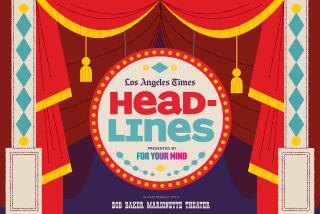I’m OK, You’re OK . . . Maybe; Book Outlines Mental Disorders
- Share via
Health and medical writers have a tendency to worry that they’ve got whatever condition they’re researching. When you consider that recently I’ve written about bowel complaints, bad breath, flatulence, extra body hair and sexual problems, this is not funny.
Thus, I was nervous when a colleague handed me a lay medical book titled “Am I Okay?” (“I know I’m not OK, so this book is of absolutely no interest to me,” he said.)
Turns out that “Am I Okay?” is a popular guide to a more scholarly tome called “Diagnostic and Statistical Manual of Mental Disorders, Fourth Edition” (or DSM-IV, for short), the American Psychiatric Assn. book that describes all the psychiatric complaints that can afflict human beings.
Mental health workers swear by DSM-IV, which despite its rather dry title is doing quite well--with book sales surpassing the 1 million mark. One million! We are not talking “Chicken Soup for the Soul” readability here, but despite that, many copies of DSM-IV have been purchased by regular folks interested in their own or their loved ones’ well-being.
“Am I Okay?” (Touchstone Books) is a much easier read. The hope of its authors (both of whom were centrally involved in crafting DSM-IV) is that it will help people catch psychiatric illnesses early, when they’re more easily treatable. But, the authors stress, you shouldn’t use the book as a way to win fights with your nearest and dearest by diagnosing them with personality disorders or obsessive-compulsive tendencies in the middle of a spat. “Psychiatric diagnosis should not become a sophisticated form of name-calling,” they write.
Packed with information about pain disorders, eating disorders, psychoses and more, the book explains something interesting: that many psychiatric problems are exaggerated versions of behaviors and feelings that--in their milder forms--have been very useful for survival.
Binge-eating, the authors write, was probably a useful behavior back when food was scarce. Mania is an extreme version of the pleasure that rewards us for doing things that are good for us. And take phobias--it’s useful to have an inborn fear of heights you can tumble from, water that can drown you or animals that might hurt you. Phobias for fast cars, street drugs and electric sockets are much rarer: We haven’t had time to evolve to be afraid of these modern-day hazards.
I’m up to Chapter 7: euphoric or irritable mood. I’m really excited about it! (You got a problem with that, pal?)
Sending Doctors Back to the Writing Board
Doctors, we know, are famed for their messy handwriting: It’s the stuff of jokes but also the stuff of occasional disastrous mistakes (when a patient is given the wrong medicine, for example). In an attempt to clean up the penmanship at Cedars-Sinai Medical Center, more than 50 doctors will attend a writing class Tuesday night, performing three hours of drills in a cursive, italic-style handwriting, “with tips on the correct position of paper, the size of letters, the lengths of strokes, and how one should hold the writing instrument.”
Cedars-Sinai chief of medical staff Paul B. Hackmeyer, who organized the class, said nurses and administrative staff helped recruit doctors who would, as he diplomatically put it, “best benefit” from the class.
There’s even a contest! Doctors who can decipher the handwriting of two of their specially selected colleagues get Sunday brunch for two at a Beverly Hills hotel.
Finally, as a postscript to an item we ran some while back on interesting doctors’ names, we recently stumbled upon a psychiatrist named Benjamin Bunney. Were his parents aware they had given him the same name that Beatrix Potter gave Peter Rabbit’s cousin? Worth some therapy either way, we’d imagine.
More to Read
Sign up for our Book Club newsletter
Get the latest news, events and more from the Los Angeles Times Book Club, and help us get L.A. reading and talking.
You may occasionally receive promotional content from the Los Angeles Times.






